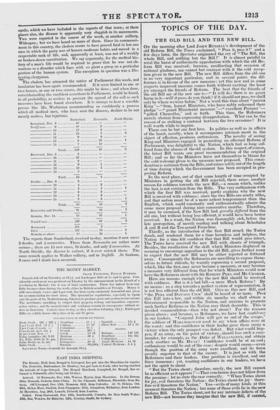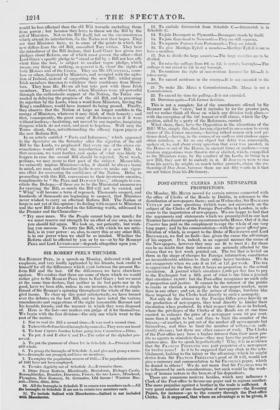TOPICS OF THE DAY.
THE OLD BILL AND THE NEW BILL.
ON the morning after Lord JOHN RUSSELL'S development of the old Reform Bill, the Times exclaimed, " Pass it, pass it!" and a few days later, the Spectator originated the cry of' " The Bill, the whole Bill, and nothing but the Bill !" It is almost painful to recal the burst of enthusiastic approbation with which the old Re- form Bill was received; because, recollecting that occasion of national gladness, one cannot but contrast with it the cold recep- tion given to the new Bill. The new Bill differs from the old one in no very i important particular, and in several points the dif- ference is n favour of the new measure; yet this new and in some respects improved measure comes forth without exciting the least joy amongst the friends of Reform. The best that the friends of the old Bill say of the new one is—" It will do; there is no great harm in it—will it pass, do you think.? if it should not pass, we shall only be where we were before." Not a word this time about " patriot King "—" firm, honest Ministers, who have nobly redeemed their pledge "—" grand Ministerial measure "—" excellent Premier "— " gifted Chancellor," and so forth. This time, the Reformers merely abstain from expressing disapprobation. What can be the reason of so striking a contrast between the two occasions ? It is well worth while to inquire.
There can be but one first love. In politics as well as in affairs of the heart, novelty, when it accompanies intrinsic merit in the object of affection, produces enthusiasm. The novelty of seeing King and Ministers engaged in promoting an effectual Reform of Parliament, was delightful to the Nation, which had so long suf- fered from the abuses of the old system. In this respect, of course, the latest Bill wants one great recommendation of' the original Bill ; and so far the Ministers have not themselves to blame for the cold welconie given to the measure now proposed. This consi- deration is extrinsic from the Bills, and arises solely out of the length of time during which the Government has been occupied in pro- posing Reform. In the next place, out of that same length of time occupied by Ministers in getting the old Bill rejected, there arises another
reason for coldness towards the new reason which, unlike the last, is not extrinsic from the Bills. The very enthusiasm with which the first Bill was received, partly explains why the new Bill is received with coldness; since the two Bills are nearly alike, and that nation must be of a more ardent temperament than the English, which could constantly and enthusiastically admire the same mere proposal during nine consecutive months. Therefore, it may be surmised, if the New Bill had greatly differed from the old one, but without being less efficient, it would have been better received. In a word, the Nation was thoroughly sick, before the late prorogation, of merely reading and talking about Schedules A and B and the Ten-pound Franchise.
Thirdly, as the introduction of the first Bill struck the Tories dumb, and rendered them for a time harmless and helpless, the Nation for a time felt confident that that Bill would pass intact. The Tories have received the new Bill with shouts of triumph. Besides, the recollection of the skill which Ministers displayed in seeming to encourage opposition to the old Bill, gives further room to expect that the new Bill may be either rejected or frittered away. Consequently the Reformers are unwilling to expose them- selves to future ridicule, by warmly espousing a second proposal, which, like the first, may never become a measure, or may become a measure very different from that for which Ministers would now have the Reformers shout with Sir ROBERT PEEL and Mr. CROKER.
Here are reasons enough why the new Bill should be received with coldness. But is it a bad bill—a mere Mock Reform ? By no means : as a step towards a perfect system of representation, it is not less efficient than the old Bill. Give us this new Bill, and "the PEEL and DAWSON Crew" shall be heard of no more. Pass this Bill into a law, and within six months we shall obtain a Government responsible to the Nation, and anxious to promote such further Reforms as the Nation may think desirable. This is decided commendation—then why not shout? For the reasons given above; and because, as Reformers, we have lost confidence in our leaders. "Corporal Jolla will get us out of the scrape," the soldiers of MARLBOROUGH used to say when affairs were at the worst; and this confidence in their leader gave them many a victory when the only prospect was defeat. But what would hap- pen, if an army, on the point of victory, should lose such a com- mander, for example, as the Duke of WELLINGTON, and obtain such another as Mr. HUNT? Confidence would be at an end; enthusiasm would be out of the case; despair would ensue,—even though the position of the army were excellent, and its force greatly superior to that of the enemy. It is just so with the Reformers and their leaders. Our position is excellent, and our force immense; yet, wanting confidence in our leaders, we have not the spirit to shout.
" But the Tories shout ; therefore, surely, the new Bill cannot be as efficient as it appears ?"—That conclusion does not follow from the premise : let us state the case correctly. "When Tories shout for joy, evil threatens the Nation: the Tories shout for joy • there- fore evil threatens the Nation." Yes—evils of many kinds at this moment threaten the Nation; but none of those evils lie in the new Bill. The Tories shout, not for any intrinsic defects of the new Bill—not because they imagine that the new Bill, if carried, would be less effectual than the old 13;:il towards excluding them from power ; but because they hei:.e to throw out the Bill by the aid of Ministers. Not on the itself, but on the circumstances which attend its introduction, do the Tories rest their hopes. They see that Ministers have, as to some of the points in which the new differs from the old Bill, consulted Tory wishes. They hear the introducer of the Bill declare, that Lord GREY has given two pledges about Reform, one of which must govern the other—that Lord GREY'S specific pledge to " stand or fall by a Bill not less effi- cient than the last," is subject to another vague pledge, which means any thing or nothing, so general is it, about the rights of both Houses and of the Crown. They see Mr. O'CONNELL, some- how or other, disgusted by Ministers, and occupied with the agita- tion of Ireland, instead of supporting the new Bill ; whilst many Irish members threaten to withdraw their confidence from Minis- ters. They hear Mr. HUME all but take part with those Irish members. They recollect how, when Ministers were all-powerful through the enthusiastic support of the Nation, the Tories suc- ceeded in delaying the progress of the old Bill, and in procuring its rejection by the Lords, when a word from Ministers, having the King's confidence, would have insured its being passed. Finally, they observe that the Nation at large no longer confides in the energy of Ministers, whatever it may think of their honesty ; and that, consequently, the great army of Reformers is as if it were without leaders,—hesitating, not moved by one impulse, imagining dangers which do not exist, and next to hopeless. Well may the Tories shout, then, notwithstanding the efficacy (upon paper) of the new Reform Bill.
In an article entitled " Facts and Inferences," which appeared in the Spectator on the Saturday after the rejection of the old Bill by the Lords, we prophesied that every one of the above cir- cumstances would attend the introduction of a new Bill. On that occasion, we went further, and spoke of what was likely to happen in case the second Bill should be rejected. Next week, perhaps, we may recur to that part of the subject. Meanwhile, we earnestly implore Ministers—who, it should be always borne in mind, are men, and therefore liable to err—to make one vigor- ous effbrt for recovering the confidence of the Nation. Delay in proceeding with this Bill, concessions to their inveterate enemies, compliments to " the PEEL and DAWSON Crew," attempts to con- ciliate the Bishops,—if these are to be the Ministerial manoeuvres for carrying the Bill, so surely the Bill trill not be carried, and " Whig" will become a term of reproach. Thousands suspect, and hundreds of thousands are beginning to suspect, that Ministers never wished to carry an effectual Reform Bill. The Nation at large is not yet of this opinion : its feeling with respect to Ministers and the new Bill is described in the following words, addressed to the Premier and the Chancellor- " Try once more. We the People cannot help you much; for we must reserve our strength for an efihrt of our own, in case you should fail again. We look on, not patiently, but wish- ing you success. To carry the Bill, with which we are satis- fied, is in your power : so, also, to carry this or any other Bill, is in our power when we shall be so minded. Whether the Reform shall be effected by you or by us—or by Sir ROBERT PEEL and Lord LYNnituasr—depends altogether upon you."



























 Previous page
Previous page